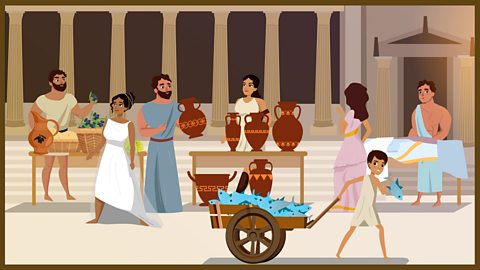The song and other video content explores what the Olympic Games were like in Ancient Greece - very different to the Games that we know today!
The song
'Get training' - vocal
Get training, get training
Get training, get training
For running and jumping
Get training…
Greeks, prepare to do your best
In the Olympic sports contest
Sprint fast with those Grecian feet
Legs leap long-jumps, don’t get beat!
Get training, get training
Get training, get training
For discus and javelin
Get training…
Spin that metal discus round
Up it goes, then down to ground
Throw the javelin high in air
Watch it land, way over there!
Get training, get training
Get training, get training
For wrestling and boxing
Get training…
Watch for broken bones and blood
Wrestle rivals to the mud
Hope they don’t jump up again
Box with fists, ignore the pain!
Get training, get training
Get training, get training
For chariots with horses
Get training…
Pounding hooves and shouts and squeals
Hear the neighing, hear the wheels
Focus hard and don’t look back
Race, race, race around the track!
Get training, get training
Get training, get training
Get training, get training, Olympics!
Get training, get training
Get training, get training
Get training, get training, Olympics!
A lively, energetic song focusing on the original Olympic Games and reflecting Ancient Greek attitudes to sport, including violent sports such as wrestling and boxing. The Games began as a religious festival for the god Zeus and became a popular competitive athletic event, with temples and stadiums at Olympia.
The tune of each refrain has phrases going up, down, up, down etc, to suggest training regimes, with the key words changing in each refrain to introduce the events. Then the spoken, rap-style verses highlight the skills involved in the sports of running, jumping, discus, javelin, wrestling, boxing and chariot racing. These verses can be spoken in time all together, or by individuals or small groups.
Refer to the Teacher Notes for more information about the song, including follow-up music activities based on it and suggestions for cross-curricular study.

Context: how were the Olympic Games in Ancient Greece different from the Games of today?
4: The Olympic Games (but not as we know them)
LEONIDAS:
Running. Jumping. Throwing. Wrestling. Boxing. Horse racing. We’ve got it all going on!
Welcome to Olympia, the site of the original Olympic Games.
My name is Leonidas. I can run. Really fast. I’ve pretty much dominated the running events at four consecutive Olympic Games. One day they’ll make a statue of me with the inscription ‘He had the speed of a god.’
The Olympic Games are a massive deal for us. They’re held every four years to honour of the King of the Gods - Zeus. So they’re as much a religious festival as a sporting event. The statue of Zeus here is one of the seven wonders of the Ancient World, and on the third day - the middle day of the Games - 100 oxen are sacrificed in his honour.
The games are so important that a truce - or ekecheiria - is called across the city-states of Greece. Meaning all wars or disputes must be paused so that athletes and spectators can travel safely to and from Olympia.
And this is the stadium where it all happens. Now these guys are just training so they’re allowed to wear pants. But when they perform during the Games they’ve got to be naked and covered in olive oil. Yep…
So, let’s start with running. As I said, I’m the best…of all time. All the races take place on a straight track in the stadium that’s about 185 metres long. The stadion race was one length; the diaulos was two lengths; and the dolichos was…erm…longer. I didn’t do that race so I have no idea how long it was, and people can’t seem to agree how long it actually was anyway.
I’ve won the stadion, the diaulos and another race called the hoplitodromos, when we run in full military armour. In 40-degree heat. Pretty tough.
There are combat sports - wresting, boxing and pankration, which is a mix of boxing and wrestling where pretty much anything is allowed…except biting and eye-gouging. No one needs that.
The throwing events are discus: athletes hurl a heavy diskos made of bronze, iron or stone as far as they can. And javelin: athletes hurl a wooden spear as far as they can. Fun if you like that kind of thing.
In the long jump athletes jump as far as they can, using weights in their hands to gain momentum, rather than a long run up. There’s also a man playing a flute to help them get into a swinging rhythm for the jump. Strange, I know…
The pentathlon is a five-event contest combining running, jumping, discus, javelin and wrestling.
Now you may have noticed there aren’t any women here. That’s because women are not allowed to take part in the Games. Except in one capacity: training the horses for the equestrian events.
The first woman to win an event - as a trainer that is - was Cynisca of Sparta. She won the four-horse chariot race with her team in two consecutive Olympics. Her victories have inspired women all over Greece to start taking part in the horse events.
The other events are a two-horse chariot race and a horse-riding contest. The chariot races are pretty violent, with everyone bashing into each other as they race. Oh, and the chariot drivers are the only ones who aren’t naked. Guess it might spook the horses.
If you win your event - or multiple events like me - you’re given a wreath of leaves, and you become a legend in your home city. ‘Touched by the gods’ as they say. I’m not one to disagree.
Our guide to the Olympic Games is Leonidas of Rhodes (born 188 BCE), a hero of the original Olympic Games who won running races at four consecutive Olympiads between 164 and 152 BCE. Leonidas describes the main events of the Games and we also learn that the purpose of the Games was to honour the god Zeus.
Leonidas describes the running events that he excelled in, including the hoplitodromos - a race undertaken in full armour. He describes the combat sports - wrestling, boxing and pankration, a combination of both wrestling and boxing in which almost anything is permitted. He also describes the throwing events - discus and javelin - and jumping events. He reflects on the fact that women are not allowed to compete, except as trainers for the equestrian events, and honours Cynisca of Sparta (born c 442 BCE) who had great success training teams for chariot races.
Leonidas offers some interesting facts along the way - including that the athletes had to compete completely naked!

Resources
'Get training' - instrumental
Get training, get training
Get training, get training
For running and jumping
Get training…
Greeks, prepare to do your best
In the Olympic sports contest
Sprint fast with those Grecian feet
Legs leap long-jumps, don’t get beat!
Get training, get training
Get training, get training
For discus and javelin
Get training…
Spin that metal discus round
Up it goes, then down to ground
Throw the javelin high in air
Watch it land, way over there!
Get training, get training
Get training, get training
For wrestling and boxing
Get training…
Watch for broken bones and blood
Wrestle rivals to the mud
Hope they don’t jump up again
Box with fists, ignore the pain!
Get training, get training
Get training, get training
For chariots with horses
Get training…
Pounding hooves and shouts and squeals
Hear the neighing, hear the wheels
Focus hard and don’t look back
Race, race, race around the track!
Get training, get training
Get training, get training
Get training, get training, Olympics!
Get training, get training
Get training, get training
Get training, get training, Olympics!
Teacher Notes. document
Click to download / print the Teacher Notes (pdf)
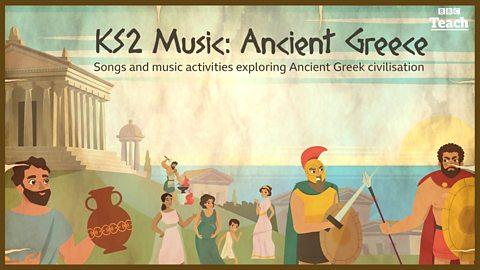
Get training - Lyrics. document
Click to download / print the lyric sheet (pdf)
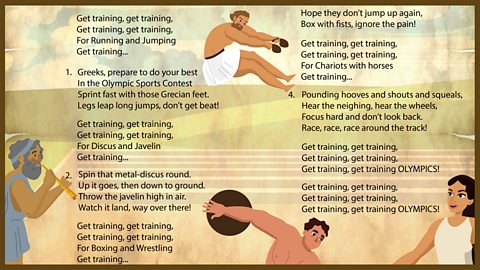
Get training - Music. document
Click to download / print the music sheet (pdf)
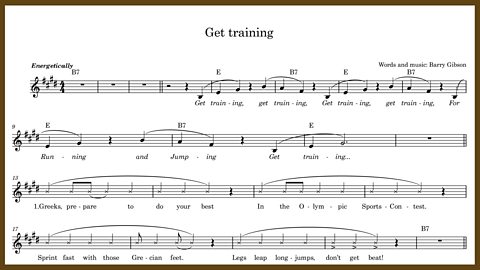
Download audio
Download the backing track of the song (mp3)

The stadion and diaulos races. image
Click to display image full size
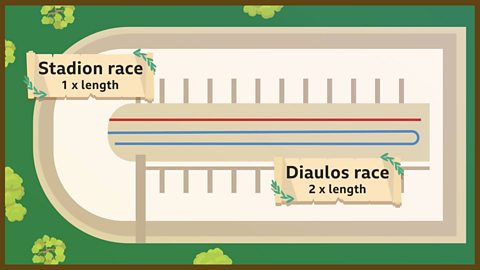

More from KS2 Music: Ancient Greece
5. Philosophy
Exploring the Ancient Greek contribution to philosophy, maths, astronomy, medicine - and more.
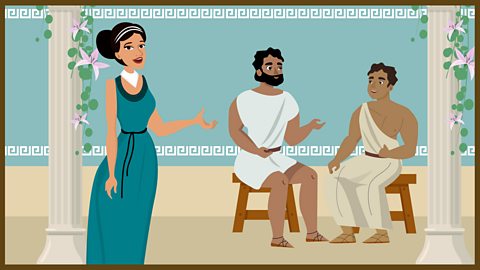
6. Story, story, story
A song referencing many of the best-known myths and stories of Ancient Greece.
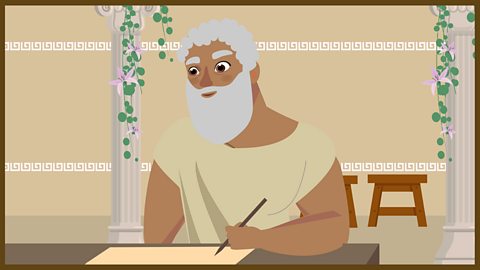
1. Busy ancient city, Athens
Everyday life in the city-state of Athens in its golden age, 2500 years ago.
